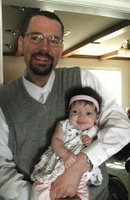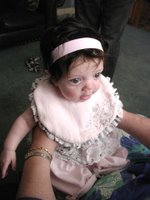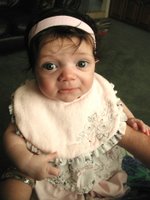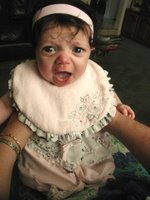Conference Highlights
Just got back from the Open Theology and Science conference held April 10-12, 2008 at Asuza Pacific University.
It was quite a fun conference. My wife and baby daughter accompanied me, and we all had a good time. Baby Janelle was a big hit with the other participants. Unfortunately, one of the presenters, Bill Hasker, was not able to make the conference due to the whole airline grounding fiasco.
The conference opened with a plenary session by Francis Collins, head of the human genome project. He had a lot of good things to say about the integration of religion and science and even closed his talk by whipping out his acoustic guitar and leading the audience (about 300 people) in signing a hymn, "God of Faith and Learning".
I have two points of critique regarding what Collins said. First, he conflates the notion of common descent (for which he gave some rather impressive evidence) with naturalistic evolution, the idea that the historical process of descent that has given rise to the "tree of life" has involved no non-natural causes. The evidence for the latter thesis is scant and much less impressive. Second, his criticism of Intelligent Design invoked the standard “cooption” response to Behe's irreducible complexity argument. What Collins does not seem to realize is that this response in not even close to being a refutation of ID. That the bacterial flagellum “might” have been cobbled together from existing molecular components does not show that such a scenario is even remotely plausible.
The following morning, things got underway with a devotional from local pastor T. Scott Daniels of the Pasadena Nazarene Church (he called it "Paz Naz" for short). His talk was entitled "Waiting for the Church to Open". He told of a homeless woman who, despite the assistance they've tried to give her, always waits outside for the doors of the church to open so. When they do, she partakes of the free coffee and refreshments inside and attends the service. Daniels related this to the position of many open theists, who often feel rather "homeless" in the modern American church scene. Often suspected (wrongly, I submit) of heresy, some have found themselves booted out of or ostracized from the fellowship of other Christians. The analogy certainly resonated with a number of people at the conference, myself included.
I'll spare a detailed recounting of each of the presentations I heard. All of them were interesting, and everyone at the conference was exceeding nice. One thing I particularly enjoyed was the opportunity to hang out with the likes of Robin Collins, Dean Zimmerman, Greg Boyd, and Patrick Todd (a grad student at UC Riverside whom I've interacted with by email but had never met face-to-face).
My own presentation on "The Fourfold Openness of the Future" went quite well. I had a good discussion with the above-mentioned folks, as well as Alan Padgett. I've still got to iron out some kinks in my argument. When I get in polished a bit, I'll post it here.
The final evening all of us involved with the conference went over to Karen Winslow's house (she's an Old Testament scholar at Azusa Pacific) where we ate dinner and hung out discussing things like the problem of evil, the metaphysics of time, and South Park until late in the evening. Sunday morning, my wife and I went to the Winslow's church (Karen's husband, Dale, pastors a Free Methodist church a couple blocks from Azusa Pacific). I had never been to a Free Methodist service before. It was nice. The people there were very friendly.




